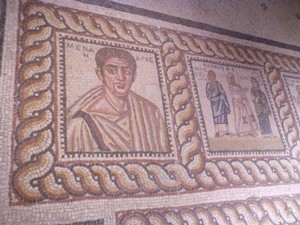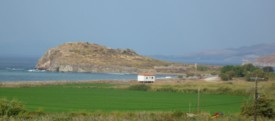 |
|
|
Mary Papoutsy to Speak at Annual CANE Meeting 2014: "Overview of Archaeological Sites on Lesbos" |
|
|
(HCS)--The 108th Annual Meeting of the Classical Association of New England will be held March 7-8, 2014 at St. Anselm College in Manchester, New Hampshire. Founded in 1905, the Classical Association of New England (CANE) is the professional organization for classicists in the six New England states. CANE’s mission is to foster the study of the classical world through the association’s many activities and resources, including the annual meeting in March, scholarships, discretionary grants, CANE’s own press, and New England Classical Journal (NECJ). |
|
|
The two-day professional conference will feature scholarly papers and workshops delivered by experts from throughout the country on a range of topics concerning classical research and pedagogy. For a complete schedule of the conference papers, click here (187KB pdf). Among those scheduled to speak will be Mary Papoutsy, of Rye Beach, NH, a noted Greek-American educator and philanthropist: "An Overview of the Archaeological Sites of Lesbos." Her talk will include a slide presentation of sites and artefacts, focusing on the principal ancient cities of Lesbos from the classical period.
|
|
Until more recent decades, little had been systematically unearthed on the island and analyzed in the wider context of the northeastern Aegean region and the nearby shores of Asia Minor. A wealth of literary history and sharp political divide with the opposing coastlines contributed to the lapse of archaeological investigations. Recent fine work by the Greek national archaeological service and teams from Canada have helped fill in the gap in historical knowledge with excavations primarily in the island's capital, Mytilene. The medieval "Castro" which dominates the city's peninsula, has been excavated over a period of seasons, beginning in the mid-1980's. A scattering of digs throughout the city by the Greek teams have unearthed rich mosaics and painted wall murals dating to the Hellenistic period, now on stunning display in the new archaeological museum of Mytilene. |
 Detail of mosaic floor from Roman era"Menander" House in Mytilene. Photo by M. Papoutsy |
Archaeologists have confirmed that the island was prosperous overall, and truly a bridge between east and west. Finds share traits with the rest of the Greek-speaking islands and mainland, while simultaneously bearing characteristics of eastern communities in Asia Minor. With these findings, Lesbos finally assumes her prominent and rightful place in the history--and prehistory--of the northeastern Aegean. Yet the work of archaeologists has hardly begun. While densely inhabited cities like Methymna, Mytilene, and Eresos may never be adequately examined, ancient Antissa and Pyrrha remain isolated, beautiful locations,waiting for energetic teams to begin more thorough excavations and analyses. The future possibilities of these sites may well be infinite, urging scholars and and travelers alike to stop at the island and to investigate. Several universities now conduct educational sessions on the island, notably Lewis & Clark of Oregon, the University of Southern Maine (geology), and a Norwegian university. Could there be a collaborative multi-instutional program for New England faculty and students here? |
|
|
(Posting date 07 January 2014) HCS encourages readers to view other articles and releases in our permanent, extensive archives at the URL http://www.helleniccomserve.com/contents.html. |
|
|
|
|
2000 © Hellenic Communication Service, L.L.C. All Rights Reserved.
http://www.HellenicComServe.com |
|

